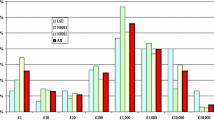Abstract
An ethical measure of income inequality corresponds to a social ordering of income distributions. Without interpersonal comparisons, the only possible social orderings are dictatorial, so there can be no ethical inequality measure. Interpersonal comparisons allow a very much richer set of possible social orderings, and the construction of ethical measures of inequality.
Similar content being viewed by others
Bibliography
K. J. Arrow, ‘Values and Collective Decision-Making’, in P. Laslett and W. G. Runciman (eds.),Philosophy, Politics and Society, Vol. 3, Blackwell (1967) (and reprinted in Phelps (1973)).
A. B. Atkinson, ‘On the Measurement of Inequality’,J. Econ. Theory 2 (3), (September 1970) 244–263.
H. Dalton, ‘The Measurement of the Inequality of Incomes’,Econ. J. 30 (September 1920).
J. de V. Graaff,Theoretical Welfare Economics, Cambridge University Press, 1957.
P. J. Hammond, ‘Equity, Arrow's Conditions, and Rawls' Difference Principle’,Econometrica 44 (1976), 793–804.
R. C. Jeffrey, ‘On Interpersonal Utility Theory’,J. Philos. 68 (1971), 647–657.
M. C. Kemp and Y-K. Ng, ‘On the Existence of Social Welfare Functions, Social Orderings, and Social Decision Functions’,Economica 43 (1976), 59–66.
Y-K. Ng, ‘Bentham or Bergson? Finite Sensibility, Utility Functions, and Social Welfare Functions’,Rev. Econ. Stud. 42 (4). (October 1975), 545–569.
R. P. Parks, ‘An Impossibility Theorem for Fixed Preferences: a Dictatorial Bergson-Samuelson Welfare Function’,Rev. Econ. Stud. (forthcoming).
P. K. Pattanaik,Voting and Collective Choice, Cambridge University Press, 1971.
E. S. Phelps (ed.),Economic Justice, Penguin, 1973.
J. Rawls,A Theory of Justice, Harvard University Press, 1971.
A. K. Sen,Collective Choice and Social Welfare, Holden-Day, 1970.
A. K. Sen,On Economic Inequality, Clarendon Press, 1973.
A. K. Sen, ‘Rawls versus Bentham: An Axiomatic Examination of the Pure Distribution Problem’,Theory and Decision 4 (1974), 301–309.
J. L. Simon, ‘Interpersonal Welfare Comparisons Can Be Made - and Used for Redistribution Decisions’,Kyklos 27 (1974), 63–98.
I. Waldner, ‘Bare Preference and Interpersonal Utility Comparisons’,Theory and Decision 4 (1974), 313–328.
Additional information
I have benefited especially from reading the published and unpublished work of Parks, of Sen, and of d'Aspremont and Gevers, and I claim little originality for the ideas expressed here.
Rights and permissions
About this article
Cite this article
Hammond, P.J. Why ethical measures of inequality need interpersonal comparisons. Theor Decis 7, 263–274 (1976). https://doi.org/10.1007/BF00135081
Issue Date:
DOI: https://doi.org/10.1007/BF00135081




